Greetings from the home of the happy hausfrau! Don those aprons and follow me into the kitchen, chop chop.
By popular demand (yours) and a need for a taste of home (mine), today we’re making a quick, easy Parsi dish called ‘Papeta-par-eedu’. Say it with me now: puh-pay-taa pur ee-doo. In English, eggs on potatoes.
The eedu to my community is a member of the family. Would you eat breakfast without them? Would you not wait for them to join you at dinner? Part nutritious, part delicious and the stuff of Parsi legend, we break an eedu on top of practically anything: tomatoes, spinach, potato straws, wafers (yes, wafer-par-eedu exists), fried bananas, you get the picture. In case you don’t, know that we even break eggs in the immediate vicinity of new cars and newlyweds. No, I will not tell you what newlywed-par-eedu tastes like .
Without further ado, the cast of characters:
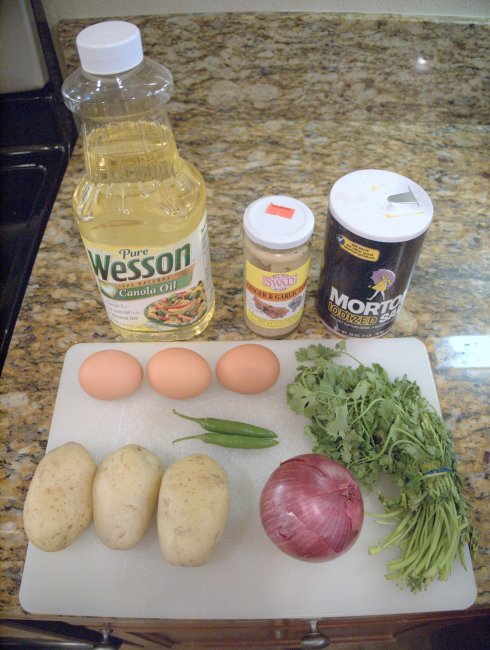
Clockwise, from left: Cooking oil, ginger-garlic paste, salt, coriander that doesn’t look like it just attended someone’s funeral, a medium-sized onion, 3 large papeta, cooked ahead of time for 3 and a half minutes in the microwave, 2 green chillies, 3 eeda (plural of eedu)
Next up, splash a little oil into a frying pan. And say “Hey, slick chick!”. The oil and pan will both thank you and then squabble about who that compliment was for. Leave them to it and get busy chopping your onion and chillies. Remember my gallant knight from this post? He’s back to the rescue.

Toss the onions (and chillies–minorities aren’t invisible, we have feelings too) into the nicely heated oil and saute until half cooked. Why half? Because picture abhi baaki hai, mere dost.
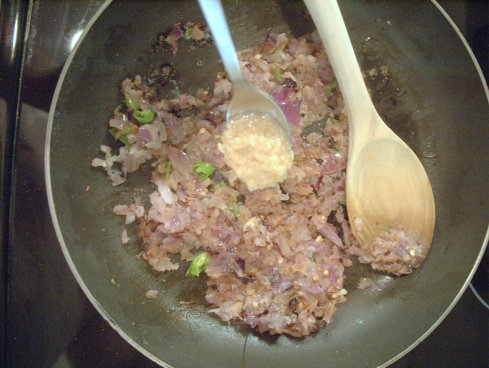
Halfway through the half-cooking, (of course that makes sense), the twin sisters of superstardom, Ginger and Garlic, make an entrance in a teaspoon, slithering among the chanting crowds, blowing air-kisses to their translucent fans. Salt brings up the rear, carrying their make-up bags.
Let them mingle with the hoi polloi. You, minion, have work to do. Remember the 3 musketeers?

Hello, Peeluddin.

I say po-tay-toh, you say poh-tah-toe…………..po-tay-toh, poh-tah-toe…………..just peel the whole thing off. And please tell me you’ve heard that song. Don’t crush a retro girl’s heart.

Slice them poh-tah-toes into rounds not more than 1/4 inch thick. If I were smart like my Mummy, I’d slice them thinner and let them cook in the pan itself. But no, I must be rebellious and Subvert Societal Slicing Standards. Thank you for bearing with my alliteration allergy.
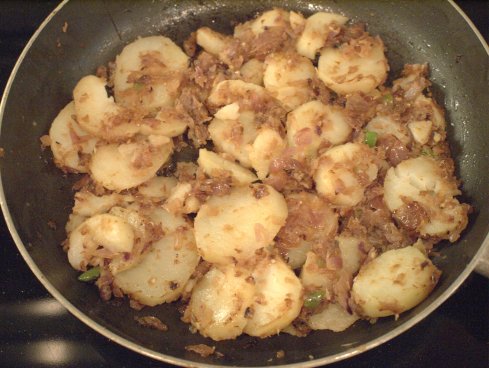
Add the slices to the pan, gently coating them with the onion mixture, and let them discuss stock market prices for 5 minutes or until cooked, whichever is sooner. This is supposed to be quick and easy, remember?
Next, flatten out the potato-onion blend to form a base, covering the entire bottom of the pan. This is important, our friend Eedu needs back-up. Then crack the eggs onto this base and marvel at the golden orb of perfection that is each eedu.
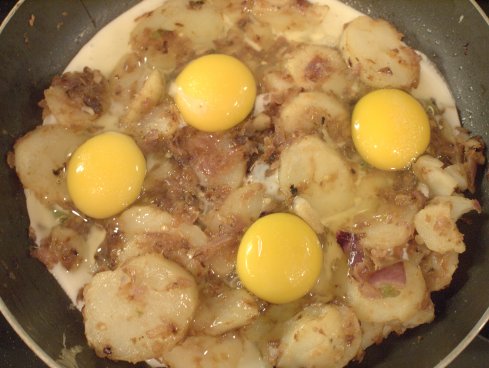
See what I mean? Sprinkle salt on top of the eggs, both yolks and whites. And then, I get to use my 2 favorite phrases:
1) Put a lid on it
2) Make it sizzzzzle, baby

Let the lid steam up. And control your anxiety about not being able to see what’s going on. Do you keep an eye on your kids all the time?
Teachers leave them eggs alone. (Name that song.) (Okay fine, so I modified it.) (A little.)
Depending on whether you like your yolks firm or runny, keep the lid on longer or shorter by 2 to 3 minutes. Once the egg whites start congealing like peace flags, you’ll know that is a Sign and the war is over.
Remember our pal coriander? Now’s a good time to lop her head off and sprinkle her onto the rapidly-forming eggs. I’d share a picture, except the dork who took it accidentally deleted it from her folder. The fools I have to deal with.
Put the lid back on for another 90 seconds. When you’re good and ready, no rush now, food and stoves have no scientific correlation to burning, yank the pan off the heat and let it cool a wee bit. [This PSA in the interest of your safety comes from Lady Burns.]
Carve a big slice of papeta-par-eedu, put it on a plate (or a baking tray or banana leaf, whatever floats your boat) and serve with rotlis (the Parsi word for roti/chappatis/unleavened bread) and a dollop of gaajar-meva-nu achaar (carrot-raisin pickle, served at Parsi weddings). Like so:
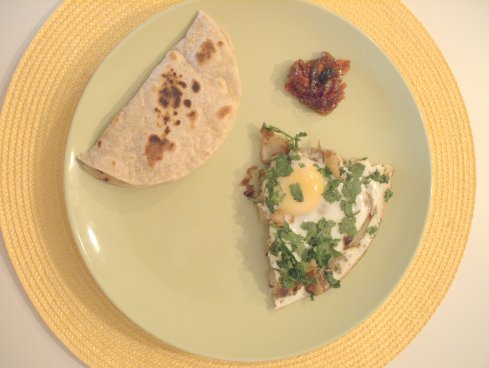
You know when people talk about “ghar ka khaana” and I frequently catch myself saying “Not my ghar!” in my head? This is it. My comfort food. Warm, soothing, with simple flavors and memories of a childhood lived in a 100-year-old home.
Dig in. But not before you say “Jumjoji”, the Parsi equivalent of ‘bon appetit’.
Tags: cooking, food, Parsi, photography, picture, recipe

























Vox populi